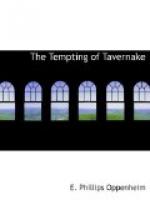“I don’t intend it,” Tavernake declared.
“Say, this is a great evening for me!” the professor went on, eagerly. “I found out by accident myself. I was at the bar and I saw her come in with a lot of others.”
“Why don’t you go and speak to her?” Tavernake asked.
The professor shivered.
“There has been a disagreement,” he explained. “Beatrice and Elizabeth have quarreled. Mind you, Beatrice was right.”
“Then why don’t you go to her instead of staying with Elizabeth?” Tavernake demanded, bluntly.
The professor temporarily collapsed. He drank heavily of the whiskey and soda by his side, and answered gloomily.
“My young friend,” he said, “Beatrice, when she left us, was penniless. Mind you, Elizabeth is the one with brains. It is Elizabeth who has the money. She has a strong will, too. She keeps me there whether I will or not, she makes me do many things —many things, surely—which I hate. But Elizabeth has her way. If I had gone with Beatrice, if I were to go to her now, I should be only a burden upon her.”
“You have no money, then?” Tavernake remarked.
The professor shook his head sadly.
“Speculations, my young friend,” he replied, “speculations undertaken solely with the object of making a fortune for my children. I have had money and lost it.”
“Can’t you earn any?” Tavernake asked. “Beatrice doesn’t seem extravagant.”
The professor regarded this outspoken young man with an air of hurt dignity.
“If you will forgive me,” he said. “I think that we will choose another subject of conversation.”
“At any rate,” Tavernake declared, “you must be fond of your daughter or you would not come here night after night just to look at her.”
The professor shook out a handkerchief from his pocket and dabbed his eyes.
“Beatrice was always my favorite,” he announced solemnly, “but Elizabeth—well, you can’t get away from Elizabeth,” he added, leaning across the table. “To tell you the truth, Mr. Tavernake, Elizabeth terrifies me sometimes, she is so bold. I am afraid where her scheming may land us. I would be happier with Beatrice if only she had the means to satisfy my trifling wants.”
He turned to the waiter and ordered a pint of champagne.
“Veuve Clicquot ’99,” he instructed the man. “At my age,” he remarked, with a sigh, “one has to be careful about these little matters. The wrong brand of champagne means a sleepless night.”
Tavernake looked at him in a puzzled way. The professor was a riddle to him. He represented no type which had come within the orbit of his experience. With the arrival of the champagne, the professor became almost eloquent. He leaned forward, gazing stealthily down at the round table.
“If I could tell you of that girl’s mother, Mr. Tavernake,” he said, “if I could tell you what her history, our history, has been, it would seem to you so strange that you would probably regard me as a romancer. No, we have to carry our secrets with us.”




